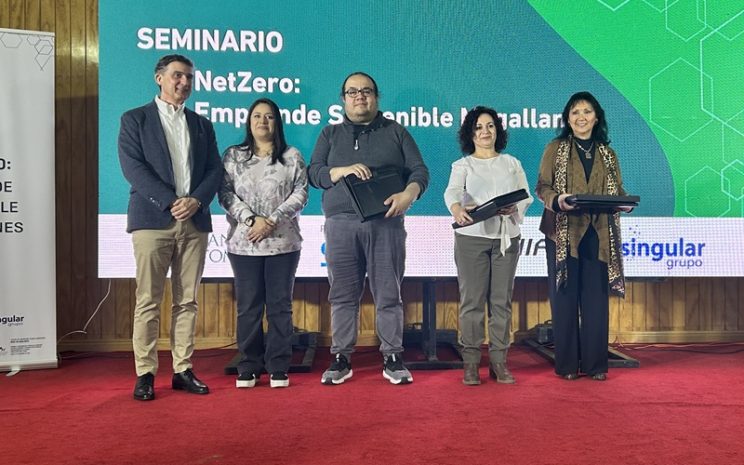NetZero Project Concludes with Awards for the Three Best Sustainable Business Proposals

With the recognition of the three best business proposals, the closing seminar of the NetZero: Emprende Sostenible Magallanes program took place. This project trained entrepreneurs in areas such as sustainability, renewable energy, decarbonization, and innovation related to green hydrogen and its derivatives.
The initiative, supported by Corfo through its Viraliza funding line and executed by the Santo Tomás Professional Institute in Punta Arenas, consisted of a training process made up of seven modules — four theoretical, two practical, and a field trip to HIF’s Haru Oni pilot plant. HIF, a pioneering company in the production of e-fuels, led most of the training sessions.
Valeska Acevedo, Rector of Santo Tomás Punta Arenas, highlighted the importance of the program in shaping participants’ skills and its contribution to regional development.
“We are very proud to contribute to this entrepreneurial ecosystem. Today we close a project in which over 30 entrepreneurs were trained in technology, developed business ideas, and refined their proposals to incorporate sustainability and innovation, helping to drive the economic development of our region,” she stated.
María José Navajas, Regional Director of Corfo Magallanes, emphasized the program’s value as a platform for innovation and business development.
“It’s an honor to be here at this closing stage. The greatest achievement is seeing how an idea can become a real project connected to sustainability, carbon neutrality, and green hydrogen. Over these months, 33 entrepreneurs received essential tools that now allow them to bring their ideas to life with a solid foundation for future growth,” she said.
From the e-fuels industry, HIF played a key role in the entrepreneurs’ training. Juan Eduardo Gallardo, HIF’s General Manager in Magallanes, praised the project and the participants’ progress.
“When we were invited, we immediately accepted because we strongly believe in entrepreneurship, innovation, and collaboration. We’ve seen a very positive evolution—from initial ideas, some already formalized, to stronger, clearer business proposals. This environment of innovation and cooperation allowed participants to find new partners, connect, and project their businesses. It’s an initiative that should be repeated and expanded,” he commented.
During the seminar, the three proposals with the highest evaluation scores were recognized. All shared a common goal: designing business solutions that help reduce emissions and advance the transition toward a cleaner economy. Additionally, 33 entrepreneurs were certified for completing the program, confirming their commitment and participation in the 52 instructional hours included in the training plan.
One of them, Lilian Tapia, a Hospitality and Tourism student at Santo Tomás and creative recycling entrepreneur, shared her experience:
“During these months, I acquired tools I didn’t have before, such as transforming waste into products—for example, earrings made from recycled plastics. I believe this allows me to contribute to the decarbonization path. I’m very grateful to the project and to Santo Tomás for making it possible for me to participate,” she emphasized.
Another participant, Patricia Vera, highlighted the value of collaboration fostered by the program.
“It was a tremendous and very enjoyable experience. We had the opportunity to connect with others on the same path, to develop our ventures further. This project is a boost to prepare us for what’s coming, as many opportunities will emerge here. It paves the way for continued work and collaboration among us,” she concluded.
The project’s closing seminar also featured a keynote lecture by Kenneth Gent, advisor and speaker, who discussed the opportunities and challenges ahead for the Magallanes Region within the context of green hydrogen development and sustainability.
It is worth noting that the program’s technical advisory was provided by Grupo Singular, with the collaboration of key actors such as Hub Magallanes and the Regional Environmental Ministry Office (Seremi de Medio Ambiente).
